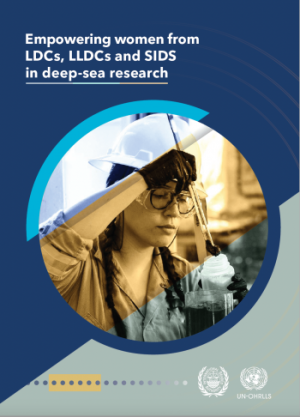
Recognizing that the challenge of underrepresentation of women in ocean science constitutes a significant impediment to the implementation of the United Nations Convention on the Law of the Sea (UNCLOS) and the achievement of the goals and targets of the 2030 Agenda for Sustainable Development, the International Seabed Authority (ISA), in partnership with the United Nations Office of the High Representative of the Least Developed Countries, Landlocked Developing Countries and Small Island Developing States (UN-OHRLLS) launched the Women in Deep-Sea Research (WIDSR) project in 2021. This partnership aims to address the critical challenges faced by women scientists from developing States in actively participating in and accessing opportunities for career development and leadership roles in highly qualified sectors such as deep-sea research, with a view to contributing to strengthening the resource base of these countries in such highly technical areas of work.
The first area of action of the WIDSR project aims to improve the availability of data and information to provide better understanding and analysis of gender specific barriers and solutions in deep-sea research, particularly for the least developed countries (LDCs), landlocked developing countries (LLDCs) and small island developing States (SIDS).
This report summarizes the key findings of a gender mapping exercise of the deep-sea research field and related disciplines and activities in LDCs, LLDCs and SIDS. Additionally, it summarizes the key findings of an analysis conducted to identify the critical barriers faced by women scientists from LDCS, LLDCs and SIDS in participating in and accessing leadership positions in this field of work.It is intended to inform all relevant stakeholders including governments, donor agencies, international and regional organizations, multilateral development banks, academia, industry, civil society and the international scientific community working in ocean affairs. It is also anticipated that the findings of this report will stimulate discussions on how to foster international and regional cooperation towards concrete actions in support of women's empowerment and leadership in deep-sea research.